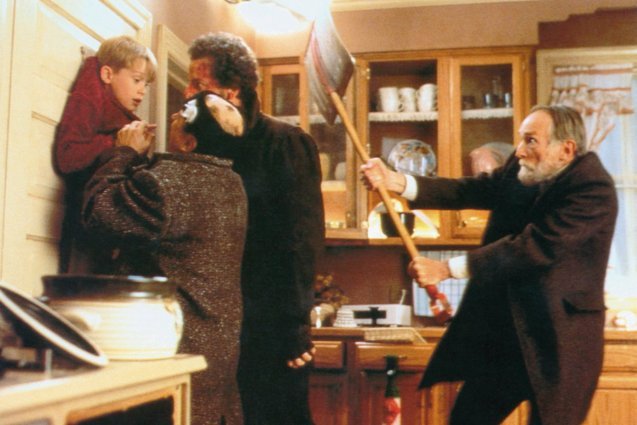
In the era of the World Wide Web, the story for Home Alone would go something like this: young Kevin wakes up and realizes that his family is nowhere to be found. Wanting to make sure that they haven’t disappeared, he grabs his iPad, checks Buzz’s Twitter feed which says, “On the way to the airport. Can’t wait to check out Paris babes!” Relieved, Kevin brings up FaceTime to contact his mother and let her know that he was left behind. She takes a cab back to the house, goes onto the airline’s website to change their flight and the two of them fly out a short while later to enjoy Christmas. The end.
When British scientist Tim Berners-Lee drew up his proposal in 1989 for what would become the World Wide Web, he was just hoping to share information within the scientific community. Instead, 25 years later the Web has changed daily life for most people in ways that are too numerous to list. The rise of the Web also did something else that wasn’t anticipated… it changed movies.
From a practical standpoint, the entertainment industry has taken full advantage of the Web. Every new movie release has a web presence for marketing purposes. Websites like Netflix and Amazon deliver streaming films. There are sites to tell you when movies are playing, that rate them, that show trailers and that sell movies. Thanks to Kickstarter, there are even websites that help finance productions.
What the Web has also done is changed the way that filmmakers have to tell their stories. Besides Home Alone, there are a variety of plot points that had to be abandoned once the Web became an omnipresent part of life. Sam’s family in Sixteen Candles wouldn’t have forgotten her birthday, because they all would’ve gotten Facebook reminders. Dr. Richard Kimble doesn’t have to go all over Chicago to find his wife’s killer in The Fugitive; he just needs access to Google. Ferris Bueller would’ve been busted as soon as his parade antics went viral on YouTube. In Sleepless in Seattle, Jonah would’ve just brought up Annie’s profile on the Baltimore Sun website and said “See, she’s pretty!” Die Hard basically wouldn’t have a plot left… same with My Cousin Vinny and numerous others.
Screenwriters and directors now have to account for the Web (and cell phones), when plotting out their stories. Want to update Romeo & Juliet? Have fun trying to work around the leads not e-mailing, Skyping or texting. Want to remake The Usual Suspects? Better have an answer for why that picture of Keyser Soze isn’t available on any law enforcement websites.
Anyone wishing to tell a story with farcical elements has to work harder than ever to create the ruse, because no part of it can hinge on information that is readily available on the Web. If the character could look it up on Wikipedia, it’s kind of hard to explain why they wouldn’t just do that.
While some have skirted the issue by finding the few corners of the world that technology hasn’t reached — think Babel — a number of filmmakers have instead sought solace in the past. Whether it’s Ben Affleck with Argo, David O. Russell with American Hustle, Quentin Tarantino with Django Unchained or J.J. Abrams with Super 8, big name directors are opting to tell stories from before the dawn of websites as a way around dealing with the issue. Of the nine Best Picture nominees this year, four were set before 1990… and two of the others took place in the middle of the ocean (Captain Phillips) and in space (Gravity).
Of course, one of the other nominees showed a different path that filmmakers can now explore to tell new and interesting stories. Spike Jonze’s Her made technology a character all on its own. Instead of just altering the ways that filmmakers tell stories — and studios produce and market movies — maybe over the next 25 years of its existence the World Wide Web will become a movie star in its own right. Hey, it’s not any more farfetched than the various John Hughes plot devices from the ’80s that the Web has rendered obsolete.


